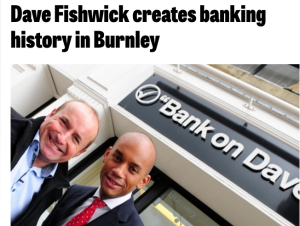Dave Fishwick creates banking history


David Fishwick’s “tiny bank” is the model of banking the world should move towards in the wake of the devastating financial crisis of 2008, says Steve Baker MP, chairman of the Banking in Britain All Party Parliamentary Group in the article published in Burnley Express, 30th July 2013
Steven Baker MP also praised the work of the now world-famous Burnley Savings and Loans in a chapter on banking reform in a new NEF Banking 2020 Government book.
The minibus millionaire’s Keirby Walk “bank” has also helped rewrite a new chapter in banking history – being used as a new model for banking in the new parliamentary standards published last month.
Mr Fishwick said: “The Government is starting to take it very seriously. Parliament is using some of our ideas to push the banking standards forward to change banking in Britain.
Steven Baker MP wrote about Mr Fishwick’s ground-breaking documentary “Bank of Dave”, saying:
“It shows banking can be a simple entrepreneurial function providing a safe return to savers at the entrepreneur’s risk.
“Of course, thanks to regulators it is not actually a bank – it is a savings and loans firm. Whereas these route savings to borrowers, banks create credit.
“That is, a bank loans credit into existence.”
The MP said that this distinction and other features of the financial system had led the whole world into economic crisis.
He continued:
“Yet astonishingly, David Fishwick has struck on a model of banking close to a theoretical ideal – he carries his own commercial risks and, even if he could deposit, he would not provide credit in excess of savings.”
Mr Baker MP added: “It is towards this model that the world should move.”
This model of banking is exactly what Positive Money is advocating for – that is, the banks would only be allowed to lend money that had already been entrusted with them by savers willing for their funds to be used for investment purposes. They will not be able to “loan credit into existence” – or in other words, to “create money”, as is currently the case.
After Positive Money reforms the banks would need to attract the funds that they want to use for any investment purpose (whether it is for loans, credit cards, mortgages, long-term investing in stocks or short-term trading in financial markets). In order to lend money, banks will need to find customers who are willing to give up access to their money for a certain period of time. In practice, this means that the customer will need to invest their money for a defined time period (e.g. 4 weeks , 6 months, 2 years, etc.) or set a minimum notice period that must be given before the money can be withdrawn (e.g. 28 days, 56 days, 6 months, etc.).
Banks will then operate in the way that most people think they currently do – by taking money from savers and lending it to borrowers (rather than creating new money whenever they make a loan). For customers of the bank, this means they will only be able to earn a rate of return (interest) if they are willing to give up access to their money for a certain period of time.
The person or institution providing the bank with funds would be able to specify in broad terms the type of investment activity it could be used for (e.g. for small business, renewable energy, mortgages, etc.). The private banks would be required – subject to a regulator’s oversight – to indicate the level of risk as well as the rates of return that would be paid to a saver in the event of a successful investment and the proportion of the saver’s money that would be returned in the event of failure such that both the bank and the positive-interest saver faced risk.
This model of banking is one part of Positive Money proposals for a reform of the money system. The other crucial part is a new way of money creation, since currently the main suppliers of money into the economy are the commercial banks.
You can read the Positive Money proposals in Plain English here.
After these reforms, the structure of banking will allow banks to fail, no matter their size. There would be no bailouts.
The reforms will help create an economy where entrepreneurs, innovators and the real economy can thrive by – as much as possible – ensuring that investment goes to businesses, science and technology, rather than into asset price bubbles or financial market speculation.
And the risks and the rewards would be re-aligned, so that those who stand to gain from the upside of risky investments also stand to take the downside.
Read Positive Money proposals in Plain English.